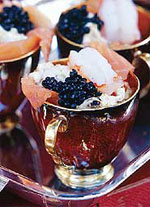Since the United Nations froze exports of wild sturgeon from the Caspian Sea earlier this year in an effort to protect the endangered fish that produces the gourmet eggs, amateurs have been falling back on farmed caviar — an idea which connoisseurs used to sneer at.
Ninety percent of the world’s sturgeon, one of the world’s oldest species of fish, live in the Caspian Sea, and their caviar has been prized as a delicacy for centuries.
“Nature makes good things, but the genius of mankind is its ability to sometimes surpass it,” said the chairman of the Geneva-based Caviar House and Prunier, Peter Rebeiz.
The company, which touts itself as being number one in the world in the production and distribution of caviar, raises its sturgeon at a fish farm, set up in the 1920s in the southwestern French town of Montpon-Menesterol, where it produces about five tonnes of caviar each year.
With advice from Russian and Iranian specialists, “we have created the best caviar in the world,” Rebeiz boasted.
In a few years, he continued, “three, four or five caviar farms” in different countries will be turning out a product which could be consistently better than wild caviar especially if it has been smuggled by illegal poachers.
“With wild sturgeon, one can never be sure of the result,” he said. “Today certain producers of wild sturgeon try to pass their product off as farmed caviar.”
The Caviar House product is currently available in airport boutiques and downtown gourmet shops in a half dozen European countries. By the end of the year, it is to make its debut in Dubai and “very soon” in Moscow. “We will be the first foreigners to sell caviar to the Russians,” Rebeiz claimed.
To add to the luxe image affixed to all things French, the last batch of caviar was baptized “Love”, and included a Yves Saint Laurent-designed lid. The 125-gram box sold for 375 euros.
Rebeiz, who discovered caviar at the age of four, long before inheriting his father’s business, said he best enjoys the gourmet eggs with just a sprinkling of pepper to bring out the taste.
At their Geneva offices, Caviar House organises champagne and caviar soirees for about 500 Swiss francs (315 euros) per person, an initiative designed more for public relations reasons, introducing a rare delicacy to a wider public, than as a money-spinning event.
And like all luxury products, the eggs lend themselves to tales of extravagance.
About 10 years ago, the company said it had received an order for 100 kilos (220 pounds) from a couple who were holed up in a downtown luxury hotel. The client wanted to take a caviar bath, Rebeiz said.
More recently, an elderly customer who regularly shelled out the requisite 3194 dollars (2500 euros) for a kilo of the so-called black gold, finally revealed the purpose of her decadent purchases.
“It’s for my cat,” she told salespeople.

